Related Research Articles
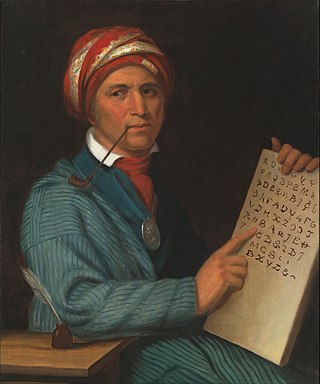
The Cherokee people are one of the Indigenous peoples of the Southeastern Woodlands of the United States. Prior to the 18th century, they were concentrated in their homelands, in towns along river valleys of what is now southwestern North Carolina, southeastern Tennessee, southwestern Virginia, edges of western South Carolina, northern Georgia and northeastern Alabama consisting of around 40,000 square miles

The term Five Civilized Tribes was applied by the United States government in the early federal period of the history of the United States to the five major Native American nations in the Southeast: the Cherokee, Chickasaw, Choctaw, Muscogee (Creek), and Seminoles. White Americans classified them as "civilized" because they had adopted attributes of the Anglo-American culture.
The Dawes Rolls were created by the United States Dawes Commission. The commission was authorized by United States Congress in 1893 to execute the General Allotment Act of 1887.
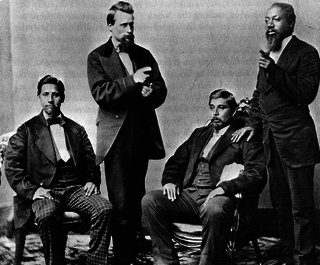
Blood quantum laws or Indian blood laws are laws in the United States that define Native American status by fractions of Native American ancestry. These laws were enacted by the federal government and state governments as a way to establish legally defined racial population groups. By contrast, many tribes do not include blood quantum as part of their own enrollment criteria. Blood quantum were first imposed by white settlers in the 18th century. Blood Quantum (BQ) is a very controversial topic.
Black Indians are Native American people – defined as Native American due to being affiliated with Native American communities and being culturally Native American – who also have significant African American heritage.
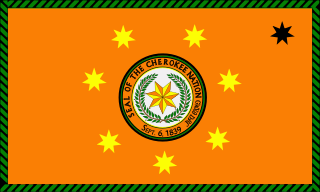
The Cherokee Nation, formerly known as the Cherokee Nation of Oklahoma, is the largest of three federally recognized tribes of Cherokees in the United States. It includes people descended from members of the Old Cherokee Nation who relocated, due to increasing pressure, from the Southeast to Indian Territory and Cherokees who were forced to relocate on the Trail of Tears. The tribe also includes descendants of Cherokee Freedmen, Absentee Shawnee, and Natchez Nation. As of 2023, over 450,000 people were enrolled in the Cherokee Nation.
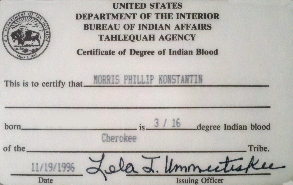
A Certificate of Degree of Indian Blood or Certificate of Degree of Alaska Native Blood is an official U.S. document that certifies an individual possesses a specific fraction of Native American ancestry of a federally recognized Indian tribe, band, nation, pueblo, village, or community. They are issued by the Bureau of Indian Affairs after the applicant supplies a completed genealogy with supporting legal documents such as birth certificates, showing their descent, through one or both birth parents, from an enrolled Indian or an Indian listed in a base roll such as the Dawes Rolls. Blood degree cannot be obtained through adoptive parents. The blood degree on previously issued CDIBs or on the base rolls in the filer's ancestry are used to determine the filer's blood degree. Information collected for the filing is held confidential by privacy laws, except if the CDIB is related to assigned duties.
The Cherokee Freedmen controversy was a political and tribal dispute between the Cherokee Nation of Oklahoma and descendants of the Cherokee Freedmen regarding the issue of tribal membership. The controversy had resulted in several legal proceedings between the two parties from the late 20th century to August 2017.
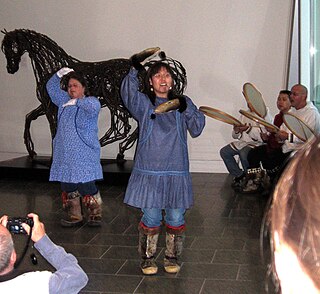
Native American identity in the United States is a community identity, determined by the tribal nation the individual or group belongs to. While it is common for non-Natives to consider it a racial or ethnic identity, for Native Americans in the United States it is considered to be a political identity, based on citizenship and immediate family relationships. As culture can vary widely between the 574 extant federally recognized tribes in the United States, the idea of a single unified "Native American" racial identity is a European construct that does not have an equivalent in tribal thought.

Native American recognition in the United States, for tribes, usually means being recognized by the United States federal government as a community of Indigenous people that has been in continual existence since prior to European contact, and which has a sovereign, government-to-government relationship with the Federal government of the United States. In the United States, the Native American tribe is a fundamental unit of sovereign tribal government. This recognition comes with various rights and responsibilities. The United States recognizes the right of these tribes to self-government and supports their tribal sovereignty and self-determination. These tribes possess the right to establish the legal requirements for membership. They may form their own government, enforce laws, tax, license and regulate activities, zone, and exclude people from tribal territories. Limitations on tribal powers of self-government include the same limitations applicable to states; for example, neither tribes nor states have the power to make war, engage in foreign relations, or coin money.

Andrea Lee Smith is an American academic, feminist, and activist. Smith's work has primarily focused on issues of violence against women of color and their communities, specifically Native American women. Formerly an assistant professor of American Culture and Women's Studies at the University of Michigan in Ann Arbor, Michigan, she is also a co-founder of INCITE! Women of Color Against Violence, the Boarding School Healing Project, and the Chicago chapter of Women of All Red Nations.

The Choctaw Freedmen are former enslaved Africans, Afro-Indigenous, and African Americans who were emancipated and granted citizenship in the Choctaw Nation after the Civil War, according to the tribe's new peace treaty of 1866 with the United States. The term also applies to their contemporary descendants.
In the United States, tribal disenrollment is a process by which a Native American individual loses citizenship or the right to belong within a Native American tribe.
Circe Sturm is a professor in the Department of Anthropology, University of Texas, Austin. She is also an actress, appearing mainly in films and commercials.
Cherokee descent, "being of Cherokee descent", or "being a Cherokee descendant" are all terms for individuals with some degree of documented Cherokee ancestry but do not meet the criteria for tribal citizenship. The terms are also used by non-Native individuals who self-identify as Cherokee despite lacking documentation or community recognition.

Chuck Hoskin Jr. is a Cherokee Nation politician and attorney currently serving as the Principal Chief of the Cherokee Nation since 2019. He was re-elected to a second term in the 2023 Cherokee Nation principal chief election.

John Wesley "Wes" Nofire is a Cherokee Nation and American politician and a former heavyweight professional boxer who has served as the Oklahoma Native American Affairs Liaison since 2023. During his boxing career Nofire fought under the name "The Cherokee Warrior". Nofire served on the Cherokee Nation tribal council between 2019 and 2023. He was a Republican candidate in the 2022 primary election for Oklahoma's 2nd congressional district and candidate in the 2023 Cherokee Nation principal chief election.
The 2023 Cherokee Nation principal chief election was held on June 3, 2023, concurrently with the 2023 Cherokee Nation tribal council elections and 2023 Cherokee Nation deputy chief election, to elect the Principal Chief of the Cherokee Nation. Incumbent principal chief Chuck Hoskin Jr. ran for re-election to a second term in office with incumbent deputy chief Bryan Warner as his running mate and was re-elected to a second term.

Cara Cowan Watts is a Cherokee Nation politician. She served on the Cherokee Nation Tribal Council from 2003 to 2015 and was a candidate for Principal Chief of the Cherokee Nation in the 2023 Cherokee Nation principal chief election.
David Walkingstick is a Cherokee Nation politician who served on the Cherokee Nation tribal council between 2011 and 2019.
References
- ↑ Evans, Desiree Y. (2006-07-22). "A case study of two Cherokee newspapers and their fight against censorship". Baylor University. Dept. of Journalism. hdl:2104/3907.
{{cite journal}}: Cite journal requires|journal=(help) - 1 2 Sturm, Circe. "Blood Politics, Racial Classification, and Cherokee National Identity: The Trials and Tribulations of the Cherokee Freedmen", American Indian Quarterly, Vol. 22, No. 1/2. (Winter – Spring, 1998), pp. 230–258
- ↑ Barbery, Marcos. "FROM ONE FIRE".
- 1 2 David Cornsilk, "An Open Letter to Defenders of Andrea Smith: Clearing Up Misconceptions about Cherokee Identification" Archived 2015-07-15 at the Wayback Machine , Indian Country Today Media Network, 10 July 2015, accessed 10 January 2016
- ↑ Serrano, Sara (January 25, 2023). "Cherokee Nation candidates lining up to file". Tahlequah Daily Press. Retrieved 4 March 2023.
- 1 2 Hunter, Chad (June 4, 2023). "Unofficial vote points to landslide Hoskin re-election". Cherokee Phoenix . Retrieved 4 June 2023.
- ↑ Sturm, Circe Dawn. Blood Politics: Race, Culture, and Identity in the Cherokee Nation of Oklahoma, University of California Press, 2002
- ↑ Cornsilk, David. "Cherokee by law in response to wannabeism". Wayback Machine. Archived from the original on 2019-06-14. Retrieved 21 December 2020.
- ↑ "Who belongs in the Cherokee Nation?". NPR. 20 July 2022.
- ↑ "Overcoming the Politics of Reform: The Story of the Cherokee Nation of Oklahoma Constitutional Convention". American Indian Law Review. 28. 2003. Retrieved 28 May 2023.
- ↑ Viren, Sarah. "The Native Scholar Who Wasn't". New York Times. Retrieved 20 June 2021.